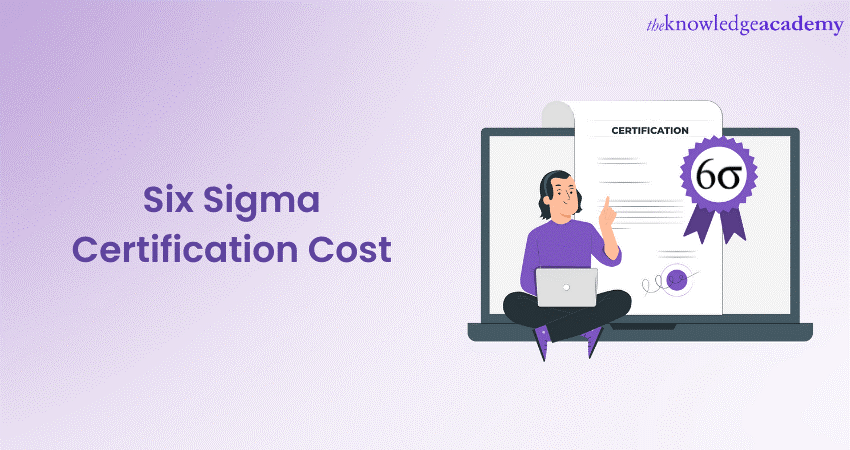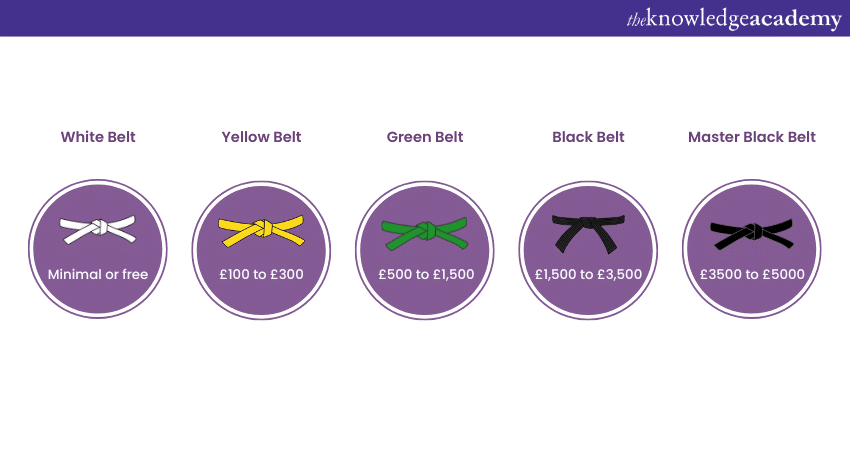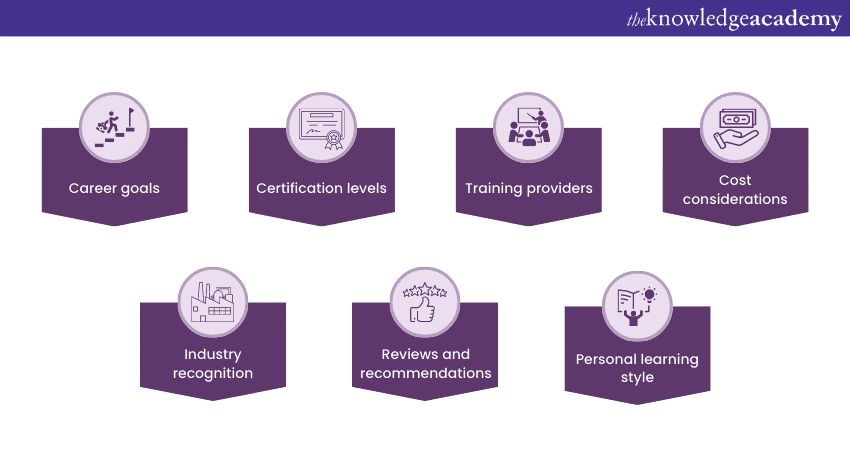We may not have the course you’re looking for. If you enquire or give us a call on +44 1344 203 999 and speak to our training experts, we may still be able to help with your training requirements.
Training Outcomes Within Your Budget!
We ensure quality, budget-alignment, and timely delivery by our expert instructors.

Professionals keen on pursuing their Six Sigma Certification must have a clear understanding of the associated costs. This blog will discuss everything you need to know about the Six Sigma Certification Cost to obtain various Six Sigma Belts from Yellow to Black Belt.
Additionally, Six Sigma is globally recognised as a methodology that helps eliminate defects, reduce variation, and enhance overall performance. It has gained a reputation as a highly valued certification, with its broad applicability across many industries. Read this blog to know the various Six Sigma Belts and Six Sigma Certification Costs/prices, along with their career prospects in detail.
Table of Contents
1) Overview of Six Sigma Certification
2) Six Sigma Certification Cost: Explained
a) White Belt Certification cost
b) Yellow Belt Certification Cost
c) Green Belt Certification Cost
d) Black Belt Certification Cost
e) Master Black Belt Certification Cost
3) How to choose your Six Sigma Certification?
4) Job prospects and salaries for Six Sigma Certified professionals
a) Prospective job positions
b) Salaries
5) Conclusion
Overview of Six Sigma Certification
The Six Sigma Certification is a globally recognised credential that validates an individual's expertise in Business Process Improvement and Quality Management. It provides professionals with the tools and methodologies to identify and eliminate defects, reduce variation, and improve the overall efficiency of business processes.
Furthermore, this certification is offered at various levels, including Yellow Belt, Green Belt, Black Belt, and Master Black Belt, each representing various levels of proficiency. Six Sigma Certification equips individuals with the skills to analyse data, implement effective problem-solving techniques, and drive continuous improvement within organisations. More importantly, it is highly valued in industries such as manufacturing, healthcare, finance, and telecommunications.

Six Sigma Certification Cost: Explained
The Six Sigma Certification Cost can vary based on the level of expertise and the training provider. Six Sigma courses help you improve your leadership, management, risk assessment, and team-building skills.
For the Six Sigma Green Belt Certification from ASQ, it costs 321 GBP for non-members and 255 GBP for members. If you need to re-appear for the exam, it costs 179 GBP. IASSC offers certification for 3 GBP. Green Belt jobs can pay around 4729 GBP to 8040 GBP yearly. Whereas Black Belt and Yellow Belt positions might earn 6620 GBP to 9460 GBP per year.

Six Sigma Certification offers different levels of expertise, known as "Belts," which signify the individual's proficiency and knowledge in Process Improvement and Quality Management. Below is a brief description of the various Six Sigma Belts:
a) White Belt Certification Cost: The White Belt Certification is an introductory level certification and provides a basic understanding of Six Sigma concepts. White Belt holders typically have a fundamental awareness of Process Improvement but may not actively participate in improvement projects.
The cost of White Belt Certification is generally minimal or sometimes even free. Some training providers may offer it as a complementary certification when pursuing higher levels of Six Sigma.
b) Yellow Belt Certification Cost: Yellow Belt Certification equips individuals with a deeper understanding of Six Sigma principles and methodologies. Yellow Belt holders can actively contribute to Process Improvement projects and work as valuable team members alongside Green and Black Belt professionals.
The cost for a Yellow Belt certification typically ranges from £100 to £300, depending on the training provider, course duration, and delivery format (online or classroom).
c) Green Belt Certification Cost: Green Belt Certification signifies a more advanced level of expertise. Green Belt holders who possess a comprehensive understanding of Six Sigma tools and techniques can lead smaller-scale improvement projects within their organisations. They analyse data, identify root causes, and implement Process Improvements.
The cost for a Green Belt Certification can range from £500 to £1,500. Factors influencing the cost include training provider reputation, course duration, study materials provided, and additional support offered
d) Black Belt Certification Cost: Black Belt Certification represents a high level of proficiency in Six Sigma methodologies. Black Belt professionals are skilled problem solvers and Project Leaders. They possess in-depth knowledge of Statistical Analysis, Project Management, and advanced improvement techniques. Black Belts often lead large-scale improvement initiatives and mentor Green Belts.
The cost for Black Belt Certification typically ranges from £1,500 to £3,500, depending on factors such as training provider, course duration, additional resources, and support provided.
e) Master Black Belt Certification Cost: The Master Black Belt Certification is the highest level of expertise in Six Sigma. Master Black Belts are seasoned professionals who have demonstrated exceptional proficiency in Six Sigma methodologies. They provide leadership, training, and guidance to Black Belts and Green Belts and also drive strategic Six Sigma initiatives within an organisation.
On average, the cost of Master Black Belt Certification ranges from £3,500 to £5,000. It's essential to research and compare different options to find a reputable training provider that offers comprehensive coursework and support to maximise the value of this advanced Six Sigma certification.
Learn the fundamentals of Six Sigma methodology by signing up for the Six Sigma Yellow Belt Course now!
How to choose your Six Sigma Certification?
When it comes to choosing your Six Sigma Certification, taking a thoughtful approach can help you make the right decision. Here are some key points to consider:

1) Career goals: Define your career aspirations and understand how Six Sigma Certification can support your professional growth. Determine the level of expertise you wish to attain and choose a certification that aligns with your goals.
2) Certification levels: Familiarise yourself with the different levels of Six Sigma Certification, such as the Yellow Belt, Green Belt, Black Belt, and Master Black Belt. Each level represents a varying degree of knowledge and skill, so choose the level that corresponds to your desired proficiency.
3) Training providers: Research and evaluate reputable Six Sigma training providers. Look for providers that have a strong track record and offer comprehensive training programs. Consider factors such as the curriculum, training methods (online, classroom, or blended), and the qualifications and experience of the instructors.
4) Cost considerations: Determine your budget for Six Sigma certification and consider the associated costs. Compare the training fees, examination fees, and costs of study materials and resources across different providers. While it's important to consider What is the Cost of Six Sigma Certification, it is also necessary to prioritise the quality and reputation of the certification program.
5) Industry recognition: Investigate the recognition and value of the Six Sigma Certifications within your industry. Some certifications may be more widely recognised and respected, which can enhance your career prospects and opportunities.
6) Reviews and recommendations: Seek out reviews and recommendations from professionals who have completed the Six Sigma certification you are considering. Their insights can provide valuable perspectives and help you make an informed decision.
7) Personal learning style: Reflect on your preferred learning style and choose a Six Sigma Certification program that caters to your needs. Some individuals thrive in a structured classroom environment, while others grow better with flexible online learning. Select a training method that suits your learning preferences.
Assist with data collection and analysis by signing up for the Six Sigma Green Belt Training Course now!
Job prospects and salaries for Six Sigma Certified professionals
Six Sigma-Certified professionals enjoy promising job prospects and competitive salaries due to the valuable skills and expertise they bring to organisations. Here is an overview of job prospects and salaries offered to Six Sigma-certified professionals:
Prospective job positions
Organisations across various industries recognise the significance of Process Improvement and Quality Management. As a result, the demand for Six Sigma-certified professionals is widespread. These professionals are sought after for their ability to streamline processes, reduce defects, and improve operational efficiency. Industries such as manufacturing, healthcare, finance, logistics, and information technology often have job opportunities tailored to Six Sigma practitioners.
With Six Sigma Certification, professionals can pursue a range of job roles, including:
a) Process Improvement Specialist/Manager
b) Quality Assurance Analyst/Manager
c) Operations Manager
d) Project Manager
e) Continuous Improvement Manager
f) Supply Chain Analyst/Manager
g) Data Analyst
h) Business Analyst
Salaries
The salaries for Six Sigma-Certified professionals can differ based on various factors such as job role, industry, level of certification, experience, and geographical location. Generally, Six Sigma Certifications contribute to higher earning potential and career advancement. According to various industry reports, here are some approximate salary ranges for different job roles:
|
Certification Level |
Salary Range |
|
Yellow Belt |
£32,000 - £42,000 |
|
Green Belt |
£41,000 - £66,000 |
|
Black Belt |
£35,000 - £96,000 |
|
Master Black Belt |
£82,000 - £107,000 |
Source - ITJobsWatch
a) Yellow Belt Certified: The average salary for individuals with Six Sigma Yellow Belt Certification is around £30,000 to £45,000 per year, depending on experience and industry.
b) Green Belt Certified: Professionals with Six Sigma Green Belt Certification can earn salaries ranging from £40,000 to £70,000 annually. Higher salaries are often associated with more extensive experience and expertise.
c) Black Belt Certified: Six Sigma Black Belt Certified professionals typically earn higher salaries due to their advanced skill set. The average annual salary for Black Belt-Certified individuals can range from £50,000 to £90,000 or more.
Determine the correct strategy for your projects by signing up for the Six Sigma Master Black Belt Course now!
Conclusion
This blog has discussed the Six Sigma Certification Cost, which professionals must take note of before embarking on the path to improve their business skills, knowledge, and career prospects. Six Sigma offers various certification levels, which interested professionals can choose to align with their goals and aspirations.
Moreover, the demand for Six Sigma-Certified professionals is consistently increasing, with abundant job opportunities. The competitive salaries associated with these certifications further highlight their value. Individuals can unlock a host of possibilities, contribute to organisational success, and embark on a rewarding and fulfilling career journey.
Learn to eliminate defects through Business Improvement by signing up for Six Sigma Certification Training Courses now!







 Top Rated Course
Top Rated Course



 If you wish to make any changes to your course, please
If you wish to make any changes to your course, please


